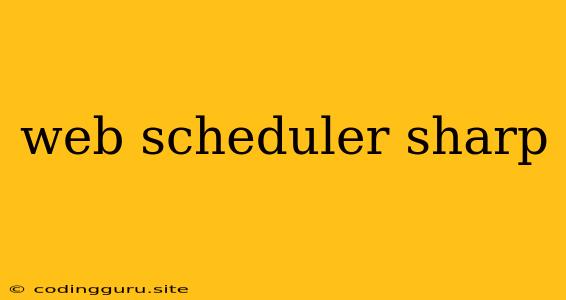The Power of Web Schedulers in C#: A Comprehensive Guide
Web schedulers are powerful tools for automating tasks and streamlining workflows within your applications. They allow you to execute specific actions at predetermined intervals, whether it's sending out email notifications, updating data, or running complex scripts. If you're a C# developer looking to leverage the capabilities of web schedulers, then this guide is for you.
What are Web Schedulers?
Web schedulers, in essence, are applications or services that allow you to define scheduled tasks that run automatically at specified times or intervals. These tasks can encompass a wide range of actions, such as:
- Data synchronization: Periodically updating data from external sources.
- Email notifications: Sending out automated reminders or alerts.
- Report generation: Creating and distributing reports based on current data.
- System maintenance: Executing routine tasks like backups or cleaning up temporary files.
- Workflow automation: Triggering events in response to predefined conditions.
Why Use Web Schedulers in C#?
The advantages of utilizing web schedulers in your C# projects are numerous:
- Increased Automation: Free yourself from manual tasks by automating them with scheduled scripts.
- Enhanced Efficiency: Streamline workflows and improve operational efficiency through consistent execution.
- Reduced Errors: Minimize human error by relying on automated processes for repetitive tasks.
- Improved Scalability: Handle increased workloads effortlessly by offloading tasks to the scheduler.
- Real-time Monitoring: Gain insights into the status of your scheduled tasks with real-time monitoring capabilities.
Popular Web Scheduling Libraries for C#
C# offers a variety of powerful libraries for implementing web schedulers within your applications. Some of the most popular options include:
- Quartz.NET: A robust and highly customizable scheduler framework. It allows you to define complex schedules, trigger actions based on various criteria, and manage task execution effectively.
- Hangfire: A popular open-source library for scheduling and executing jobs. It offers features like persistent job storage, background processing, and a user-friendly dashboard for managing tasks.
- FluentScheduler: A lightweight and easy-to-use scheduling library that simplifies the process of defining and executing scheduled tasks. It emphasizes a fluent syntax for creating and managing schedules.
Implementing a Simple Web Scheduler in C#
Let's illustrate the basics of web scheduling with a simple example using Quartz.NET.
using Quartz;
using Quartz.Impl;
public class JobScheduler
{
public static void Main(string[] args)
{
// Create a scheduler factory.
ISchedulerFactory schedFact = new StdSchedulerFactory();
// Get a scheduler instance.
IScheduler scheduler = schedFact.GetScheduler();
scheduler.Start();
// Define a job.
IJobDetail job = JobBuilder.Create()
.WithIdentity("myJob", "group1")
.Build();
// Define a trigger.
ITrigger trigger = TriggerBuilder.Create()
.WithIdentity("myTrigger", "group1")
.StartNow()
.WithSimpleSchedule(x => x
.WithIntervalInSeconds(10)
.RepeatForever())
.Build();
// Schedule the job with the trigger.
scheduler.ScheduleJob(job, trigger);
// Wait for the scheduler to complete.
Console.WriteLine("Press any key to exit...");
Console.ReadKey();
}
}
// Simple job class.
public class SimpleJob : IJob
{
public Task Execute(IJobExecutionContext context)
{
Console.WriteLine("Hello from the SimpleJob! Time: " + DateTime.Now);
return Task.CompletedTask;
}
}
In this example, we define a job called SimpleJob that prints a message to the console. We then create a trigger that runs the job every 10 seconds. The code demonstrates the core concepts of creating jobs, triggers, and scheduling them using Quartz.NET.
Advanced Web Scheduler Techniques
Beyond the basic implementation, web schedulers offer a range of advanced features and capabilities:
- Dynamic Scheduling: Modify schedules on the fly based on specific conditions or events.
- Job Dependencies: Define relationships between jobs to ensure they execute in a specific order.
- Job Retry Mechanisms: Automatically retry failed jobs after specific intervals or conditions.
- Email Notifications: Receive email alerts about successful or failed job executions.
- Logging and Monitoring: Track job execution history and identify potential issues.
Conclusion
Web schedulers are an indispensable tool for modern C# developers. They provide a robust and flexible way to automate tasks, improve efficiency, and streamline workflows. By leveraging the power of libraries like Quartz.NET, Hangfire, and FluentScheduler, you can seamlessly integrate web scheduling into your C# projects and unlock a wide range of possibilities for your applications.
